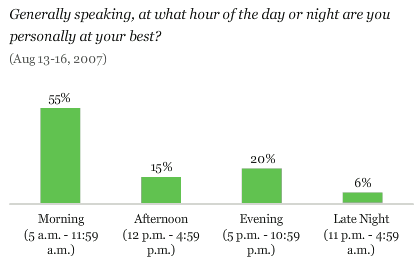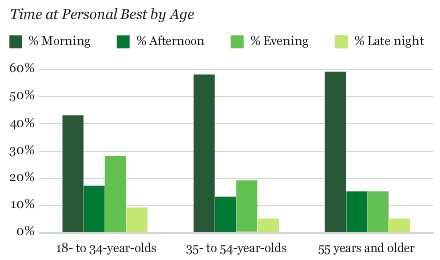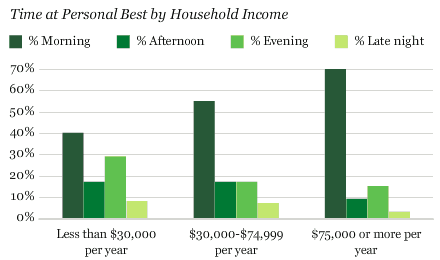GALLUP NEWS SERVICE
PRINCETON, NJ -- What time of day are Americans at their personal best? A recent Gallup Poll finds that "the morning" is how a majority of Americans answer that question, with 10 a.m. mentioned more often than any other specific time. Americans aged 35 and older are more likely than younger adults to say they are at their best in the morning, while younger adults are more inclined than older adults to say in the evening or late at night. There is also a significant difference by income -- the majority of Americans residing in upper-income households are "morning people," while only about 4 in 10 Americans living in lower-income households are.
The Aug. 13-16, 2007, poll asked Americans to say at what hour of the day or night that they are personally at their best. Fifty-five percent of Americans replied with a time in the morning (between 5 a.m. and noon). That includes 17% who specifically mentioned 10 a.m., the highest percentage for any single hour of the day. Fifteen percent of Americans say they are at their personal best in the afternoon (between noon and 5 p.m.), 20% in the evening (between 5 p.m. and 11 p.m.), and 6% late at night (between 11 p.m. and 5 a.m.).

Here are the full detailed results to this question.
Generally speaking, at what hour of the day or night are you personally at your best?
|
2007 Aug 13-16 |
|
|
% |
|
|
12 a.m./midnight |
4 |
|
1 a.m. |
1 |
|
2 a.m. |
1 |
|
3 a.m. |
* |
|
4 a.m. |
* |
|
5 a.m. |
1 |
|
6 a.m. |
3 |
|
7 a.m. |
9 |
|
8 a.m. |
10 |
|
9 a.m. |
12 |
|
10 a.m. |
17 |
|
11 a.m. |
4 |
|
12 p.m./noon |
5 |
|
1 p.m. |
2 |
|
2 p.m. |
4 |
|
3 p.m. |
2 |
|
4 p.m. |
2 |
|
5 p.m. |
3 |
|
6 p.m. |
5 |
|
7 p.m. |
4 |
|
8 p.m. |
4 |
|
9 p.m. |
4 |
|
10 p.m. |
1 |
|
11 p.m. |
1 |
|
|
|
|
No opinion |
4 |
Although Americans most often say they are at their best in the morning, there is variation in response to this question among different subgroups, particularly by age and income level. (Full results to this question by the different subgroups discussed are shown at the end of the article.)
Younger adults are less likely than older Americans to say they are at their personal best in the morning. Just 43% of adults aged 18 to 34 describe themselves as "morning people," compared with 58% of adults aged 35 to 54 and 59% of those aged 55 and older. More than one in three younger adults are best in the evening (29%) or late at night (8%). In contrast, only 24% of 35- to 54-year-olds and 20% of those who are older say they are at their best at these times.

There is an interesting relationship between this "personal best" question and income, suggesting that perhaps the "early bird gets the worm." Forty percent of Americans residing in households earning less than $30,000 per year say they are at their personal best in the morning. This percentage is much higher among those in households earning between $30,000 and $75,000, at 55%, and higher still among those in households earning $75,000 or more per year, at 70%.

Several other groups show modest variation in their reports of when they are at their best each day:
- Americans employed full or part-time are more likely than those who are not employed to say they are at their personal best in the morning (60% to 50%).
- Married adults are slightly more likely than unmarried adults, by a 59% to 51% margin, to say they are at their best in the morning hours. The reason married adults and unmarried adults differ is attributable to gender -- with married men (62%) much more likely than unmarried men (46%) to say they are at their best in the morning. Married women and unmarried women do not differ that much from one another in this regard.
- Sixty-two percent of parents with school-aged children say they are at their best in the morning. This compares with 52% of those without school-aged children.
Survey Methods
Results are based on telephone interviews with 1,019 national adults, aged 18 and older, conducted Aug. 13-16, 2007. For results based on the total sample of national adults, one can say with 95% confidence that the margin of sampling error is ±3 percentage points. In addition to sampling error, question wording and practical difficulties in conducting surveys can introduce error or bias into the findings of public opinion polls.
|
Generally speaking, at what hour of the day or night are you personally at your best? Full Results by Demographic Subgroups
|
||||
|
18- to
|
35- to
|
55 years
|
|
|
|
% |
% |
% |
|
|
|
Before 5 a.m. |
8 |
5 |
5 |
|
|
5 a.m. to before 7 a.m. |
-- |
3 |
8 |
|
|
7 a.m. to before 9 a.m. |
13 |
17 |
24 |
|
|
9 a.m. to before 11 a.m. |
27 |
35 |
23 |
|
|
11 a.m. to before 1 p.m. |
12 |
7 |
9 |
|
|
1 p.m. to before 3 p.m. |
4 |
6 |
8 |
|
|
3 p.m. to before 5 p.m. |
5 |
4 |
3 |
|
|
5 p.m. to before 7 p.m. |
16 |
7 |
4 |
|
|
7 p.m. to before 9 p.m. |
8 |
8 |
8 |
|
|
9 p.m. to midnight |
6 |
5 |
4 |
|
|
No opinion |
2 |
4 |
6 |
|
|
|
|
|
|
|
|
Net morning (5 a.m.-11:59 a.m.) |
43 |
58 |
59 |
|
|
Net afternoon (12 p.m.-4:59 p.m.) |
17 |
13 |
15 |
|
|
Net evening (5 p.m.-10:59 p.m.) |
28 |
19 |
15 |
|
|
New late night (11 p.m.-4:59 a.m.) |
9 |
5 |
5 |
|
|
|
|
|
|
|
|
Less than
|
|
$75,000 or more
|
|
|
|
Before 5 a.m. |
8 |
6 |
2 |
|
|
5 a.m. to before 7 a.m. |
3 |
5 |
3 |
|
|
7 a.m. to before 9 a.m. |
13 |
19 |
22 |
|
|
9 a.m. to before 11 a.m. |
19 |
28 |
40 |
|
|
11 a.m. to before 1 p.m. |
9 |
9 |
8 |
|
|
1 p.m. to before 3 p.m. |
9 |
6 |
4 |
|
|
3 p.m. to before 5 p.m. |
3 |
5 |
2 |
|
|
5 p.m. to before 7 p.m. |
11 |
9 |
6 |
|
|
7 p.m. to before 9 p.m. |
10 |
7 |
7 |
|
|
9 p.m. to midnight |
8 |
3 |
4 |
|
|
No opinion |
6 |
4 |
2 |
|
|
|
|
|
|
|
|
Net morning (5 a.m.-11:59 a.m.) |
40 |
55 |
70 |
|
|
Net afternoon (12 p.m.-4:59 p.m.) |
17 |
17 |
9 |
|
|
Net evening (5 p.m.-10:59 p.m.) |
29 |
17 |
15 |
|
|
New late night (11 p.m.-4:59 a.m.) |
8 |
7 |
3 |
|
|
|
|
|
|
|
|
Employed
|
|
|
|
|
|
Before 5 a.m. |
5 |
7 |
|
|
|
5 a.m. to before 7 a.m. |
3 |
5 |
|
|
|
7 a.m. to before 9 a.m. |
20 |
17 |
|
|
|
9 a.m. to before 11 a.m. |
32 |
24 |
|
|
|
11 a.m. to before 1 p.m. |
9 |
9 |
|
|
|
1 p.m. to before 3 p.m. |
5 |
7 |
|
|
|
3 p.m. to before 5 p.m. |
3 |
5 |
|
|
|
5 p.m. to before 7 p.m. |
8 |
8 |
|
|
|
7 p.m. to before 9 p.m. |
8 |
8 |
|
|
|
9 p.m. to midnight |
5 |
5 |
|
|
|
No opinion |
3 |
6 |
|
|
|
|
|
|
|
|
|
Net morning (5 a.m.-11:59 a.m.) |
60 |
50 |
|
|
|
Net afternoon (12 p.m.-4:59 p.m.) |
13 |
17 |
|
|
|
Net evening (5 p.m.-10:59 p.m.) |
20 |
20 |
|
|
|
New late night (11 p.m.-4:59 a.m.) |
6 |
7 |
|
|
|
|
|
|
|
|
|
Men |
Women |
|
|
|
|
Before 5 a.m. |
6 |
5 |
|
|
|
5 a.m. to before 7 a.m. |
3 |
5 |
|
|
|
7 a.m. to before 9 a.m. |
21 |
16 |
|
|
|
9 a.m. to before 11 a.m. |
28 |
29 |
|
|
|
11 a.m. to before 1 p.m. |
9 |
8 |
|
|
|
1 p.m. to before 3 p.m. |
5 |
7 |
|
|
|
3 p.m. to before 5 p.m. |
4 |
4 |
|
|
|
5 p.m. to before 7 p.m. |
10 |
7 |
|
|
|
7 p.m. to before 9 p.m. |
8 |
8 |
|
|
|
9 p.m. to midnight |
3 |
6 |
|
|
|
No opinion |
3 |
5 |
|
|
|
|
|
|
|
|
|
Net morning (5 a.m.-11:59 a.m.) |
56 |
55 |
|
|
|
Net afternoon (12 p.m.-4:59 p.m.) |
14 |
15 |
|
|
|
Net evening (5 p.m.-10:59 p.m.) |
19 |
20 |
|
|
|
New late night (11 p.m.-4:59 a.m.) |
7 |
5 |
|
|
|
|
|
|
|
|
|
Married adults |
Unmarried adults |
|
|
|
|
Before 5 a.m. |
4 |
7 |
|
|
|
5 a.m. to before 7 a.m. |
5 |
3 |
|
|
|
7 a.m. to before 9 a.m. |
19 |
19 |
|
|
|
9 a.m. to before 11 a.m. |
32 |
25 |
|
|
|
11 a.m. to before 1 p.m. |
10 |
8 |
|
|
|
1 p.m. to before 3 p.m. |
5 |
7 |
|
|
|
3 p.m. to before 5 p.m. |
4 |
5 |
|
|
|
5 p.m. to before 7 p.m. |
8 |
8 |
|
|
|
7 p.m. to before 9 p.m. |
7 |
8 |
|
|
|
9 p.m. to midnight |
4 |
6 |
|
|
|
No opinion |
4 |
5 |
|
|
|
|
|
|
|
|
|
Net morning (5 a.m.-11:59 a.m.) |
59 |
51 |
|
|
|
Net afternoon (12 p.m.-4:59 p.m.) |
14 |
15 |
|
|
|
Net evening (5 p.m.-10:59 p.m.) |
19 |
21 |
|
|
|
New late night (11 p.m.-4:59 a.m.) |
4 |
8 |
|
|
|
|
|
|
|
|
|
Married
|
Unmarried
|
Married
|
Unmarried
|
|
|
Before 5 a.m. |
6 |
6 |
2 |
8 |
|
5 a.m. to before 7 a.m. |
5 |
1 |
5 |
5 |
|
7 a.m. to before 9 a.m. |
21 |
22 |
16 |
17 |
|
9 a.m. to before 11 a.m. |
34 |
20 |
30 |
29 |
|
11 a.m. to before 1 p.m. |
9 |
10 |
11 |
6 |
|
1 p.m. to before 3 p.m. |
5 |
4 |
6 |
8 |
|
3 p.m. to before 5 p.m. |
3 |
5 |
4 |
4 |
|
5 p.m. to before 7 p.m. |
8 |
13 |
8 |
5 |
|
7 p.m. to before 9 p.m. |
5 |
11 |
9 |
7 |
|
9 p.m. to midnight |
2 |
5 |
6 |
6 |
|
No opinion |
3 |
4 |
5 |
5 |
|
|
|
|
|
|
|
Net morning (5 a.m.-11:59 a.m.) |
62 |
46 |
56 |
55 |
|
Net afternoon (12 p.m.-4:59 p.m.) |
14 |
16 |
15 |
15 |
|
Net evening (5 p.m.-10:59 p.m.) |
15 |
26 |
23 |
17 |
|
New late night (11 p.m.-4:59 a.m.) |
6 |
8 |
2 |
8 |
|
|
|
|
|
|
|
Parents with
|
Not parents of
|
|
|
|
|
Before 5 a.m. |
7 |
5 |
|
|
|
5 a.m. to before 7 a.m. |
3 |
5 |
|
|
|
7 a.m. to before 9 a.m. |
19 |
18 |
|
|
|
9 a.m. to before 11 a.m. |
37 |
25 |
|
|
|
11 a.m. to before 1 p.m. |
5 |
11 |
|
|
|
1 p.m. to before 3 p.m. |
5 |
6 |
|
|
|
3 p.m. to before 5 p.m. |
4 |
4 |
|
|
|
5 p.m. to before 7 p.m. |
10 |
7 |
|
|
|
7 p.m. to before 9 p.m. |
5 |
9 |
|
|
|
9 p.m. to midnight |
4 |
6 |
|
|
|
No opinion |
2 |
5 |
|
|
|
|
|
|
|
|
|
Net morning (5 a.m.-11:59 a.m.) |
62 |
52 |
|
|
|
Net afternoon (12 p.m.-4:59 p.m.) |
11 |
16 |
|
|
|
Net evening (5 p.m.-10:59 p.m.) |
17 |
21 |
|
|
|
New late night (11 p.m.-4:59 a.m.) |
3 |
5 |
|
|
